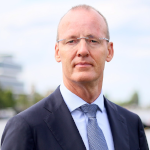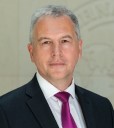Wednesday, Oct 12, 2022 | 10:00 AM - 10:30 AM
Location: Cedar Hall, HQ1-1-660

 |
Klaas Knot President of the Dutch Central Bank |
Klaas Knot has been President of DNB since 1 July 2011 and has served as Chair of the Financial Stability Board since 2 December 2021. He is also a member of the Governing Council and the General Council of the European Central Bank, member of the European Systemic Risk Board, member of the International Monetary Fund's Board of Governors and a member of the Board of Directors of the Bank for International Settlements.
Klaas holds several secondary positions. Since 2005, he has been professor of economics of central banking at the University of Groningen, and since 2015 he has also been honorary professor of monetary stability at the Economics and Business Department of the University of Amsterdam. Klaas has published a variety of articles in leading Dutch and international journals in the fields of monetary and financial economics. He is also a member of the Group of Thirty, a global body comprised of economic and financial leaders from the public and private sectors and academia.
Before assuming DNB’s presidency, Klaas Knot was Deputy Treasurer-General and Director of Financial Markets at the Dutch Ministry of Finance (2009–2011). Earlier, from 1995, he worked for DNB for almost twelve years in various positions including senior economist in the Monetary and Economic Policy Department and Director of the Supervisory Policy Division. At different intervals during this period, he was employed by the International Monetary Fund (1998-1999) and the former Pensions and Insurance Supervisory Authority of the Netherlands (2003-2004).
In 1991, he graduated with honours in economics from the University of Groningen. In 1995, he obtained his PhD in economics.
 |
Alfred Kammer Director, European Department, IMF |
Mr. Kammer was previously the Chief of Staff of the Office of the Managing Director, advising the Managing Director on strategic and operational issues and overseeing operations for the senior management team; Deputy Director of the Strategy, Policy and Review Department, overseeing the work on Fund strategy and surveillance policy; Deputy Director of the Middle East and Central Asia Department, overseeing regional economic developments and financial sector issues; Director of the Office of Technical Assistance Management, advising management on technical assistance operations and overseeing fundraising and global partnerships for capacity building; and Advisor to the Deputy Managing Director. Mr. Kammer also served as resident representative of the IMF in Russia. Since joining the IMF, Mr. Kammer worked with countries in Africa, Asia, Europe, and the Middle East, and on a wide range of policy and strategic issues.
Key Points:
Quotes:
“I think we are in an unprecedented period, and any model or quantitative rule simply suffers from the fact that it has probably been calibrated at a time and sort of data sample, in which there was no pandemic, there was no Russian invasion in Ukraine, war on the European continent and what have you.” Klaas Knot
“I do believe that climate change and the energy transition that our economies will have to undergo will be one of the major forces of structural change in our economy, of structural adjustment in our economy, and therefore is absolutely relevant for central bankers.” Klaas Knot
“We should also stand up and say that governments aside from supporting your citizens, you should also intensify your efforts to really get out of fossil fuels and move towards renewables because that is the only sustainable solution to the current, we have with high energy prices and the dearth of gas resources.” Klaas Knot
Contributor: Paris Gkartzonikas